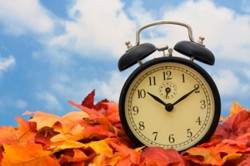
Don’t forget to set clocks back one hour before going to bed this Saturday night. Daylight Saving Time ends locally at 2 a.m. Sunday, Nov. 3.
Daylight Saving Time—the practice of advancing clocks each spring so that evenings have more daylight and mornings have less—was first mentioned by Benjamin Franklin in 1784. The modern idea of daylight saving, however, was proposed in 1895 by entomologist and astronomer George Vernon Hudson and first implemented during World War I.
Following passage of the Energy Policy Act of 2005, Daylight Saving Time was extended one month beginning in 2007. It now starts the second Sunday each March and ends the first Sunday each November.
Most people need only a day or two to adjust to the time shift, but some can take as long as a week, according to Raghu Upender, medical director of the Vanderbilt Sleep Disorders Center. Sticking to your normal bedtime and wake time to keep your internal clock in its typical rhythm can help combat Daylight Saving Time’s effect on the body. So can exposing yourself to sunlight each morning.
“The sun is a very potent synchronizer,” Upender said. “There are direct neural pathways for light that enters the retina to a structure in the brain called the suprachiasmatic nucleus, which syncs the clock every day.”
More recommendations for promoting good sleep year round:
- Establish a relaxing pre-sleep ritual, such as taking a bath, reading or listening to calm music.
- Make sure the bedroom is quiet, dark and at a comfortable temperature.
- Avoid the bright lights and stimulation of TVs, computers and other electronics before bed.
- Avoid large meals, alcohol and caffeine before bed.
- Exercise earlier in the day, not right before bed.
- Keep the same bedtime and wake time each day, even on weekends.